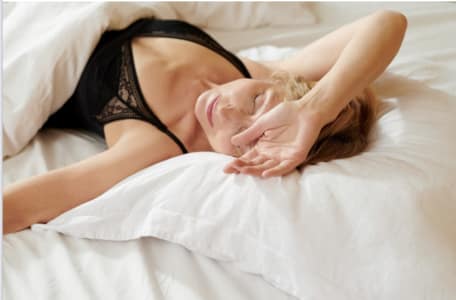[grwebform url=”https://app.getresponse.com/view_webform_v2.js?u=wfNAY&webforms_id=57753701″ css=”on” center=”off” center_margin=”200″/]
Biohacking Sleep
Biohacking sleep will get a great start to your day. Hormones, enzymes and waste products are cleared, gene expression is regulated, and our mind and body regenerate. Restorative sleep is vital for health and a lack of sleep can enable the manifestation of disease. It is, therefore, imperative that we get quality sleep every night.
So what are some easy ways to biohack sleep quality? Here are a few you should try!
Set a sleep schedule
A sleep schedule is when you go to bed and wake up at the same time every day, even on weekends. This ensures that you are not fighting against your natural body clock. Ideally, you need seven to eight hours of sleep a night, although this is not set in stone. If at all possible, go to bed when you are tired and get up when you wake up naturally. You then need to make sure you include the following hacks into your life to help you get the optimum benefit from your time in bed.
Get some natural light during the day

Vitamin D
It is also worth mentioning that sunlight is a source of Vitamin D, which is essential for many aspects of your health, but especially to help the body utilize calcium. So next time you’re feeling sluggish or having trouble concentrating, take a break and step outside into the sunlight. With daily exposure to sunlight, you can enjoy all of these benefits and more. Your body will thank you for it.
As well as getting enough natural light, it is important that the room you sleep in is dark. This is essential for the sleep hormone, melatonin, to be produced and induce deep, restorative sleep. Therefore, during summer or if you live in a country where it is daylight for more than 16 hours, getting black-out blinds or curtains is advisable. Alternatively, you can wear an eye mask.
Reduce screen time before bedtime
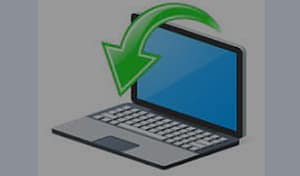
In addition, staring at a screen right before bed can keep your mind active and make it harder to wind down and relax. To get the best night’s rest, it is recommended to turn off all screens at least 30 minutes before bedtime. This gives the brain a chance to wind down and prepare for sleep. Instead, try reading a book or taking some time to relax in a bath. Or both! You’ll sleep better and wake up feeling refreshed and ready to start your day.
If you absolutely must use a screen in the evening, a great hack is to wear blue-light-blocking glasses, with amber lenses and install an app on your computer and phone that filters out blue light. Another beneficial hack app is using an app that reduces the glare on the screen, such as Twilight.
Get some red light before you hit the sack
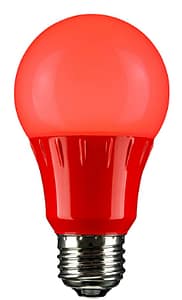
Additionally, red light helps to reduce the production of melatonin, the hormone that makes you sleepy. Exposure to red light before bed can therefore help you fall asleep more quickly and get a better night’s rest. So if you’re having trouble sleeping, try using red light bulbs in the evening. It is also worth putting a red bulb in your bedside light, or in your child’s bedroom if they prefer to sleep with the light on.
Biohacking sleep with your diet
It’s well-known that what we eat can have an impact on our physical health, but did you know that diet can also affect our sleep habits? Certain foods and drinks contain compounds that can help to promote sleep, while others can act as stimulants and make it more difficult to fall asleep. If you’re looking to get a better night’s rest, there are a few dietary changes you can make to support your sleep cycle.
Magnesium and Trytophan
To start, aim to include more foods that contain magnesium and tryptophan in your diet. Magnesium is a natural sedative that can help to relax the muscles and improve sleep. Foods that are high in magnesium include dark leafy greens, nuts and seeds, and whole grains.
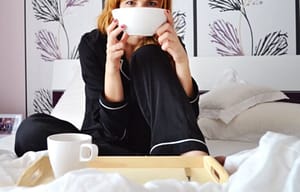
Melatonin in Foods
Foods that help you sleep and are well worth including in your diet are those that naturally contain melatonin. Foods that contain melatonin are tomatoes, walnuts, strawberries, olive oil and cow’s milk. Which goes to show that when your mother told you to have a milky drink at bedtime, she knew what she was talking about. Kiwi fruits (18) and tart cherries have also been found to improve sleep quality, reduce insomnia and help regulate sleep. Bring on the fruit salad!
In addition to these bio hacks, try not to eat less than three hours before bedtime to allow your body to digest the food. Reduce alcohol as, although it can make you sleepy, it is alcohol-induced sleep that is not restorative. Finally, do not have caffeinated drinks such as tea, coffee or cola after mid-day, as caffeine is a natural stimulant that disturbs sleep. You can drink naturally non caffinated teas including ginger, peppermint, and the famous chamomile (click here for a National Library of Medicine article about the benefits of this awesome impacting and tasting) tea.
Biohacking sleep with supplements
Another way to bio hack your way to better sleep is by using supplements. Melatonin is a hormone that helps to regulate the body’s sleep-wake cycle and it’s available as a supplement in pill form. Just one to three milligrams of a melatonin supplement can help people fall asleep more quickly and improve the quality of their sleep.

Ashwagandha is an herb known as “Indian ginseng”, with a long history of use as a medicinal herb. It is best known for its ability to relieve stress and promote relaxation. The herb is thought to work by reducing levels of the stress hormone, cortisol. This ability to reduce anxiety and promote calmness makes it an ideal herbal supplement to improve sleep and as an effective natural remedy for insomnia. It has been found to improve the sleep quality of people suffering from insomnia if used continuously for a few weeks.
Mindfulness meditation
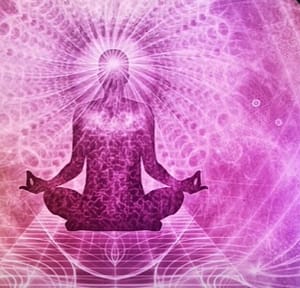
While discussing technology and how it can help you sleep, it is worth mentioning wearables.
Read our article on Mindful Meditation which will provide more background on the practice.
Biohacking Sleep and Technology
Most people are familiar with the concept of a fitness tracker. These devices are worn on the wrist and track things like steps taken, heart rate, and calories burned. However, many people don’t realize that there are also devices that can track sleep. These wearables use sensors to monitor things like heart rate and body movement during the night.
Unfortunately, this is not entirely accurate as it does not measure brainwaves, which would give more precise data. Wearables can be helpful in spotting trends and determining whether or not your sleep is improving.
Sleep Data
If you want more accurate data on your sleep quality, there are other devices you can use to bio hack your slumber. These include Apnealink air, Nox T3, Philips Alice PDx and Alice NightOne. These are slightly more invasive, less compact and can cause some discomfort. There are even devices that can be sewn into your pyjamas to monitor your sleep more accurately.
The Oura ring is another wearable tracking device that monitors sleep and activity. It uses sensors to measure heart rate, body temperature, and respiratory rate. The data is then used to estimate sleep stages, including light sleep, deep sleep, and REM sleep. The Oura ring also provides information on the length of time it takes to fall asleep, how often you wake up during the night, and how much time you spend in bed. This information can be used to improve sleep habits and track progress over time. The Oura ring is an effective tool for monitoring sleep and improving sleep quality.
AI Bed
Or you can go even further and buy a bed, with artificial intelligence, that monitors sleep. As you can imagine, these are not cheap, costing nearly two thousand dollars. They have many features, which include raising your head when snoring is sensed, monitoring the temperature and humidity of your bedroom, waking you up when the lightest phase of sleep is identified and a sleep coaching program to help improve your sleep.
There are even devices that can sense when you get into or out of bed and control the lights and temperature in your bedroom, as appropriate. Unfortunately, these devices don’t have your coffee ready for you when you wake up; but I am sure that is only a matter of time!
Bio hack your genes to help you sleep better
DNA testing is a quick and easy way to bio hack your sleep patterns. The Home DNA test analyses the genetic links between insomnia and your family, so that you can find out if you have inherited this trait.
The genes that are linked to sleep and your body clock are CLOCK, PER, CRY and BMAL1. If you discover that there are genetic variations, called polymorphisms, in your genes, it is even more important to follow the bio hacks described in this article.
Conclusion
As you can see, there are a number of ways that you can bio hack your way to better sleep. Some cost nothing, some are pretty expensive. If you are struggling to sleep, it is worth considering some of these methods and seeing which bio hack works best for you. Sweet dreams!
[grwebform url=”https://app.getresponse.com/view_webform_v2.js?u=wfNAY&webforms_id=57753701″ css=”on” center=”off” center_margin=”200″/]

